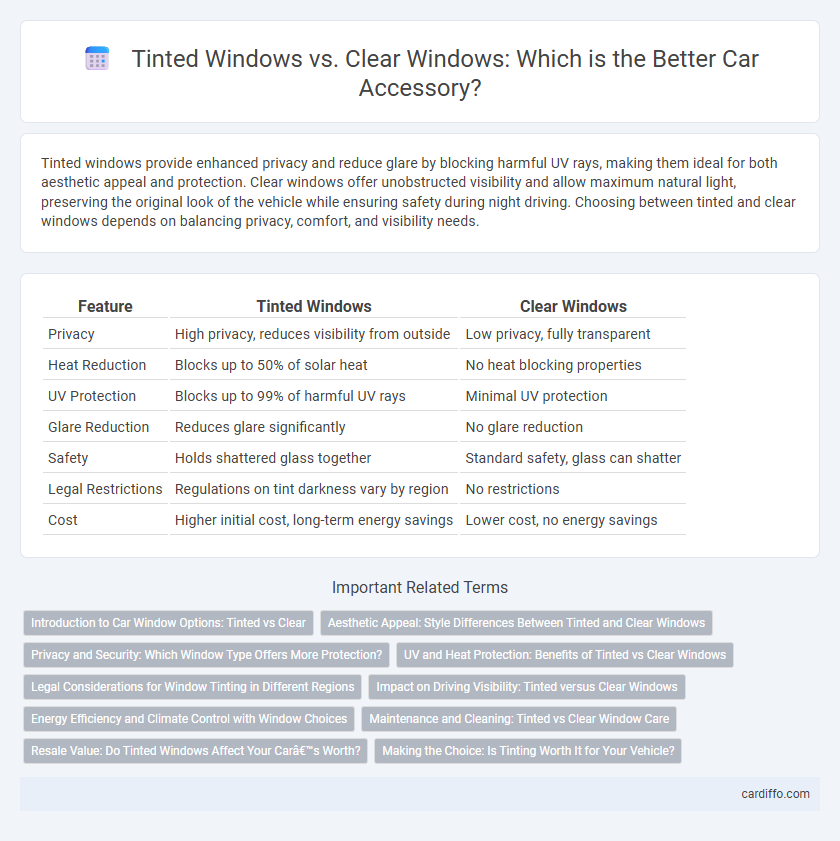Tinted windows provide enhanced privacy and reduce glare by blocking harmful UV rays, making them ideal for both aesthetic appeal and protection. Clear windows offer unobstructed visibility and allow maximum natural light, preserving the original look of the vehicle while ensuring safety during night driving. Choosing between tinted and clear windows depends on balancing privacy, comfort, and visibility needs.
Table of Comparison
| Feature | Tinted Windows | Clear Windows |
|---|---|---|
| Privacy | High privacy, reduces visibility from outside | Low privacy, fully transparent |
| Heat Reduction | Blocks up to 50% of solar heat | No heat blocking properties |
| UV Protection | Blocks up to 99% of harmful UV rays | Minimal UV protection |
| Glare Reduction | Reduces glare significantly | No glare reduction |
| Safety | Holds shattered glass together | Standard safety, glass can shatter |
| Legal Restrictions | Regulations on tint darkness vary by region | No restrictions |
| Cost | Higher initial cost, long-term energy savings | Lower cost, no energy savings |
Introduction to Car Window Options: Tinted vs Clear
Tinted car windows reduce glare and block up to 99% of harmful UV rays, enhancing privacy and protecting interior materials from fading. Clear windows provide maximum visibility and a natural look, allowing unobstructed views while driving. Choosing between tinted and clear windows depends on preferences for aesthetics, comfort, and protection.
Aesthetic Appeal: Style Differences Between Tinted and Clear Windows
Tinted windows offer a sleek, modern aesthetic by adding depth and subtle color contrast to a vehicle's appearance, enhancing privacy and a sense of sophistication. Clear windows provide a classic, unobstructed view that emphasizes transparency and simplicity, complementing minimalist design preferences. The choice between tinted and clear windows significantly influences a vehicle's style, balancing boldness with elegance.
Privacy and Security: Which Window Type Offers More Protection?
Tinted windows provide enhanced privacy by reducing visibility from outside, making it harder for potential intruders to see inside the vehicle or property. They also offer added security by blocking harmful UV rays and minimizing glare, which can help protect interiors from fading and reduce eye strain. Clear windows, while offering unobstructed views, lack these privacy and security benefits, making tinted windows a superior choice for protection and discretion.
UV and Heat Protection: Benefits of Tinted vs Clear Windows
Tinted windows provide superior UV protection by blocking up to 99% of harmful ultraviolet rays, reducing skin damage and interior fading compared to clear windows. They also significantly decrease heat buildup inside vehicles or buildings, enhancing comfort and lowering air conditioning costs. Clear windows offer minimal UV and heat protection, making tinted options more effective for long-term safeguarding and energy efficiency.
Legal Considerations for Window Tinting in Different Regions
Legal considerations for window tinting vary significantly across regions, with specific regulations on allowable tint percentages to ensure driver visibility and safety. Many states and countries enforce limits on the Visible Light Transmission (VLT) level, often restricting front side windows to higher VLT values compared to rear windows. Compliance with local tint laws is essential to avoid fines or vehicle inspection failures while balancing privacy and UV protection benefits.
Impact on Driving Visibility: Tinted versus Clear Windows
Tinted windows reduce glare from sunlight and headlights, enhancing driver comfort during bright conditions but may slightly diminish visibility in low-light or nighttime situations. Clear windows offer maximum transparency, providing the best overall visibility for detecting road hazards, pedestrians, and traffic signals. Optimal window tint levels balance glare reduction with maintaining sufficient visibility to ensure driving safety.
Energy Efficiency and Climate Control with Window Choices
Tinted windows reduce solar heat gain by blocking up to 60% of infrared radiation, enhancing energy efficiency and lowering cooling costs in warm climates. Clear windows allow more natural light but increase indoor heat, often requiring greater air conditioning use, especially during summer. Choosing tinted windows supports climate control by maintaining cooler indoor temperatures and reducing reliance on HVAC systems for temperature regulation.
Maintenance and Cleaning: Tinted vs Clear Window Care
Tinted windows require specialized cleaning solutions to preserve the film and prevent discoloration or peeling, whereas clear windows can be cleaned effectively with standard glass cleaners. Avoiding abrasive materials is crucial for tinted windows to prevent scratches that compromise tint integrity, while clear windows are generally more resistant to mild abrasions. Regular maintenance for tinted windows includes avoiding prolonged exposure to harsh chemicals and direct sunlight to extend the tint's lifespan compared to the straightforward upkeep of clear glass.
Resale Value: Do Tinted Windows Affect Your Car’s Worth?
Tinted windows can enhance a car's resale value by improving its aesthetic appeal and offering added privacy and UV protection, which potential buyers often find desirable. However, excessively dark tints or non-compliant tinting can deter buyers and reduce the vehicle's market price due to legal concerns or visibility issues. Clear windows remain a safe choice for maximizing resale value, ensuring broad buyer appeal and avoiding regulatory complications.
Making the Choice: Is Tinting Worth It for Your Vehicle?
Tinted windows offer enhanced privacy, UV protection, and reduced glare, making them a practical accessory for vehicle owners seeking comfort and safety. Clear windows provide unobstructed visibility, which may be preferred for legal compliance and better nighttime driving. Evaluating factors such as climate, local tinting laws, and personal preferences helps determine if window tinting is a worthwhile investment for your vehicle.
Tinted windows vs clear windows Infographic

 cardiffo.com
cardiffo.com